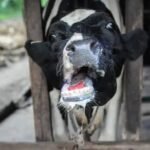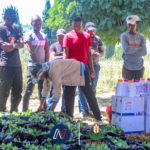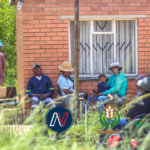At this year’s Agricultural Trade Fair 2025, one of the busiest stalls was that of Lesotho Post Bank, where farmers crowded to learn more about the bank’s growing range of agricultural finance products.
The fair, which brought together farmers, government agencies, agribusinesses, and financial institutions, offered Lesotho Post Bank a platform to explain how it is tailoring innovative loan solutions to meet the unique challenges faced by Basotho farmers.
Representing the bank at the event, Lebohang Leokaoke, an Agriculture Relationship Manager, said the fair created the perfect setting to connect directly with farmers.
“Being in an agricultural trade fair where many stakeholders and farmers are gathered enables us to spread the information, and we hope it reaches as many farmers as possible,” he noted.
According to Leokaoke, the bank’s primary mission is to empower both small- and large-scale farmers to run sustainable and profitable businesses. Through a variety of loan schemes, Lesotho Post Bank supports farming activities across the value chain, from seeds to tractors, from livestock fattening to wool and mohair trading.
“We provide loans that are not only about giving money but about strengthening the farmer’s entire production system. Our support ensures that farmers have access to inputs, proper animal feed, equipment, and infrastructure that allow them to compete and grow,” Leokaoke explained.
Supporting Crop Production
For crop farmers, the bank loans are structured to cover essential inputs such as seeds, fertilisers, pesticides, and irrigation systems. Leokaoke explained that this loan package is designed with commercial crop farming in mind, targeting crops such as carrots, peppers, tomatoes, green beans, cabbage, and cereals. Farmers who visited the bank’s stall expressed excitement at the clarity of information provided, with many admitting they had not been aware of how accessible these loans were before the fair.
Backing Livestock Enterprises
Beyond crops, Lesotho Post Bank extends its financing to livestock farmers who rear pigs, sheep, goats, and cattle.
“Working with livestock farmers is not just about helping them buy animals. We also make sure they can feed and care for them properly, because profitability only comes when animals are well-managed and healthy,” Leokaoke said, explaining that the loans cover the costs of proper feed, supplements, and veterinary care, while also supporting animal fattening for meat production, a key avenue for farmers hoping to reach both domestic and export markets.
Boosting Wool and Mohair Production
The wool and mohair industry remains a cornerstone of Lesotho’s economy, and the bank has carved out a financial product specifically for traders and farmers in this sector. Through dedicated loans, the bank helps farmers access markets, manage cash flow, and maximise profits. “By financially empowering wool and mohair farmers, we are contributing directly to one of Lesotho’s strongest export industries,” Leokaoke noted.
Tractor and Equipment Loans
One of the flagship services showcased at the fair was the bank’s tractor finance loan, which allows large-scale farmers to acquire tractors and accessories with flexible repayment options.
“Tractors and modern equipment are critical for efficiency, yield, and food security. By helping farmers access these, we ensure they remain competitive and can meet growing market demands,” Leokaoke said.
In addition, the bank offers financing for a wide range of equipment, both short- and long-term, including irrigation tools, poultry houses, chicken coops, and milking machines. Poultry farmers, in particular, benefit from loans designed to boost egg and meat production, ensuring they can scale up to meet demand with the right housing and technology.
Leokaoke also clarified the requirements for accessing loans, noting that farmers must have been active users of Lesotho Post Bank services for at least three months.
Individuals are expected to provide detailed written requests outlining the loan amount needed, along with supporting documents such as identity papers, proof of land use (lease or deed of sale), business records, and letters of support from local chiefs. For cooperatives or farmer groups, registration documents, constitutions, and IDs of all members are required.
While the process is thorough, Leokaoke stressed that the bank’s aim is not to exclude farmers but to ensure accountability and sustainability. “We want to empower farmers with affordable and accessible services. Our role is to structure financial planning that strengthens agriculture and increases food security in Lesotho,” he said.
According to Leokaoke, the fair reaffirmed the bank’s belief that direct engagement with farmers is essential for building trust and spreading awareness about available services.
“Farmers often struggle to access loans because they lack information. By being here, listening to their challenges, and explaining how our products work, we are helping to bridge that gap,” he concluded.








